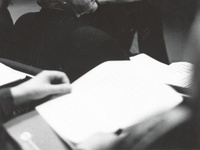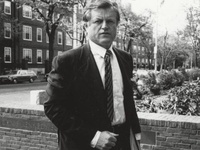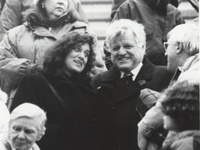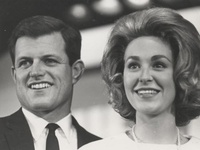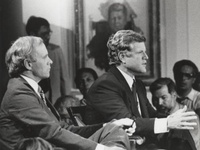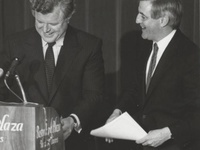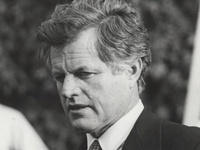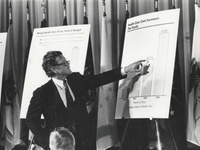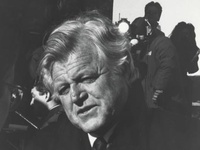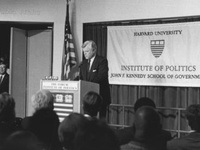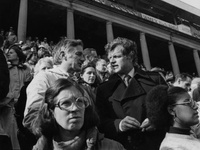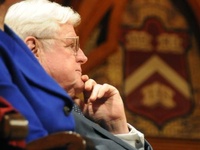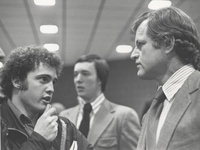His 1980 run for the presidency proved unsuccessful, particularly after the Chappaquiddick incident became a major factor in the campaign.
But while he failed to win the office his brother had once held, Kennedy carved out for himself a niche as one of the senate’s most powerful legislators.
After John F. Kennedy’s election left his Massachusetts senate seat empty, the Kennedy family arranged for a family friend to fill the post for the next two years until the youngest Kennedy was eligible to run for the seat.
Though Kennedy's voice came to be respected in foreign policy matters in the course of his tenure--from calling for peace in Northern Ireland to voting against the authorization of the war in Iraq--he was most passionate about setting domestic social policy. Despite being born into a family often referred to as the closest thing to American royalty, Kennedy focused on helping the poor and disenfranchised through many of the 300-plus successful bills he sponsored during his tenure in the Senate.
“When it came to [welfare reform], a fire would come in his eyes and you could see him rise in his chair and fill with passion,” said Kennedy School Dean David T. Ellwood ’75, who worked with Kennedy on welfare reform during the Clinton administration.
Multimedia
Kennedy began focusing his attention on learning about issues such as health care and civil rights during the months he spent recovering from a broken back and rib he suffered during a plane crash in 1964.
His civil rights victories included successfully fighting to protect the Voting Rights Act, increasing the minimum wage in the 1990s, and passing the Americans with Disabilities Act in 1990, a bill that held personal significance due to his older sister Rosemary's mental disability.
While Kennedy was unable to cast a vote in this summer's health care battle, his career saw other related victories, including the expansion of health insurance coverage for children with the passage of the State Children's Health Insurance Program in 1997.
In the years since his graduation from Harvard, Kennedy remained connected to the University. He was involved in creating the Institute of Politics, which commemorates his brother John F. Kennedy ’40. During his time serving as a member of the IOP’s Senior Advisory Committee, Kennedy almost never missed a meeting and “would light up” when he had the chance to meet with students, said Ellwood.
“We have been privileged and proud to have him as a member of the Harvard family, and I am one of the many, many people who will deeply miss his leadership, his courage, and his friendship,” University President Drew G. Faust said in a statement Wednesday morning.
In December 2008, he was awarded an honorary degree by the University in a special ceremony, as he was unable to attend the June 2008 Commencement exercises due to his illness. The audience included Kerry, Senator Christopher J. Dodd of Connecticut, and Vice President Joseph R. Biden, Jr.
“I hope that in all the time since then I have lived up to the chance Harvard gave me,” Kennedy said after receiving his honorary doctorate.
At the ceremony, Supreme Court Justice Stephen G. Breyer, a former Harvard Law School professor who served as chief counsel for the Senate Judiciary Committee when Kennedy was chair, spoke about what he had learned working with the senator, citing Kennedy’s strong commitments to bipartisanship and helping others.
“I’m proud to be here as Harvard says, ‘Well done, senator, and thank you for caring about so many, so much, for so long,” Breyer said.
The event marked one of the less than a handful of times that Harvard has awarded an honorary degree outside of the June Commencement. Three heads of state—George Washington, Nelson Mandela, and Winston Churchill—are the only people to receive similar awards at special ceremonies.
Read more in News
Marathon Racers Run for Charity








